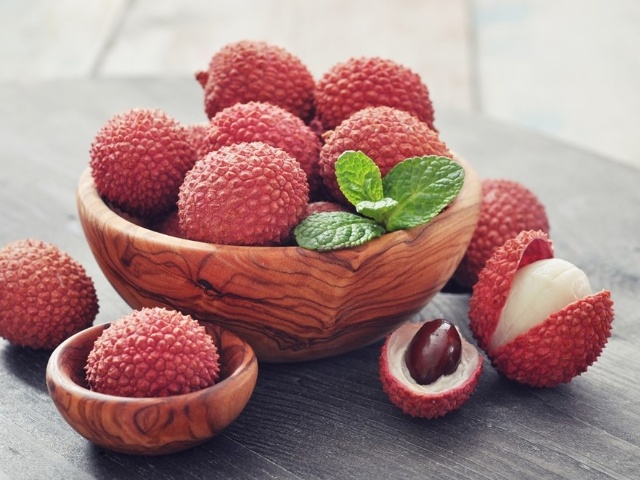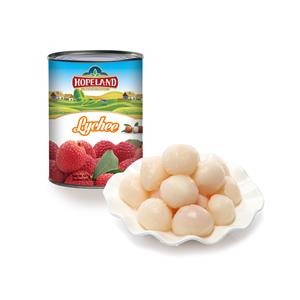Wartości odżywcze i korzyści zdrowotne liczi
1. Ryzyko hipoglikemii (niedojrzałe liczi)
Niedojrzałe liczi zawierają metylenocyklopropyloglicyna (MCPG), co może powodować niebezpiecznie niski poziom cukru we krwi u niedożywionych dzieci (co wiąże się z epidemiami w Indiach).Rozwiązanie: Zawsze spożywaj dojrzałe owoce liczi i unikaj ich nadmiernego spożywania na pusty żołądek.
2. Reakcje alergiczne
U niektórych osób może wystąpić swędzenie, obrzęk lub pokrzywka (rzadko).
3. Wysoka zawartość cukru | Osoby chore na cukrzycę powinny spożywać liczi z umiarem ze względu na ich naturalną zawartość cukru (15 g na 100 g). | 4. Ryzyko nadmiernej konsumpcji |
Nadmierne spożycie może powodować dolegliwości trawienne (wzdęcia lub biegunkę). | Jak wybierać i przechowywać liczi | Wybór świeżych liczi: |
Szukaj skóry o jasnoczerwonym lub różowym odcieniu (unikaj brązowej lub popękanej). | Owoce powinny być jędrne, ale lekko sprężyste po naciśnięciu. | Słodki, kwiatowy aromat świadczy o dojrzałości. |
Przechowywanie liczi: | Temperatura pokojowa: | 2-3 dni (najlepiej spożywać świeże). |
Mrożony: | Do 1 tygodnia w perforowanym worku. | Mrożony: |
Obierz i usuń pestki, a następnie zamroź na okres do 6 miesięcy. | Sposoby na delektowanie się liczi | Świeży |
– Po prostu obierz i zjedz jako przekąskę. | Koktajle | – Zmiksuj z jogurtem, mango i wodą kokosową. |
Sałatki | – Dodawaj do sałatek owocowych lub zielonych, aby nadać im słodyczy. | Desery |
– Używaj do sorbetów, galaretek i koktajli (np. liczi martini). | Suszone lub konserwowane | – Wygodne, ale uważaj na dodany cukier. |
Wniosek | Liczi to pyszny i pożywny owoc tropikalny pełen | witamina C, przeciwutleniacze i związki korzystne dla serca |
. Wspierają odporność, trawienie, zdrowie skóry, a nawet mogą pomóc zapobiegać przewlekłym chorobom. Jednak umiar jest kluczowy ze względu na zawartość cukru, a niedojrzałych liczi należy unikać. | Dodaj liczi do swojej diety, a zapewnisz sobie orzeźwiającą i prozdrowotną przekąskę! | 6% |
Folate | 14 mcg | 4% |
Key Nutrients Explained:
Vitamin C – A powerful antioxidant that boosts immunity, supports skin health, and enhances iron absorption.
Copper – Essential for red blood cell formation, brain health, and immune function.
Potassium – Helps regulate blood pressure and muscle function.
B Vitamins (B6 & Folate) – Support energy metabolism and neurological health.
Fiber – Aids digestion and promotes gut health.
Health Benefits of Lychees
1. Rich in Antioxidants
Lychees contain high levels of antioxidants, including:
Oligonol (a polyphenol) – Reduces inflammation and may improve blood circulation.
Vitamin C – Neutralizes free radicals, protecting cells from oxidative damage.
Flavonoids (quercetin & kaempferol) – Help combat chronic diseases like heart disease and cancer.
2. Supports Immune Function
With nearly 80% of the DV for vitamin C per 100g, lychees strengthen the immune system by:
Enhancing white blood cell production.
Reducing the severity and duration of infections.
3. Promotes Heart Health
Potassium helps regulate blood pressure.
Polyphenols may reduce LDL ("bad") cholesterol and improve blood vessel function.
Oligonol has been linked to improved circulation and reduced risk of stroke.
4. Aids Digestion
The fiber content (1.3g per 100g) promotes healthy digestion and prevents constipation.
Prebiotic properties may support beneficial gut bacteria.
5. May Help with Weight Management
Low in calories (66 kcal per 100g).
High water content (82%) promotes satiety.
Natural sweetness can help curb sugar cravings.
6. Supports Skin Health
Vitamin C boosts collagen production, reducing wrinkles and improving skin elasticity.
Antioxidants protect against UV damage and premature aging.
7. Potential Anti-Cancer Properties
Some studies suggest that lychee extracts may inhibit cancer cell growth, particularly in breast and liver cancers, due to their polyphenol content.
8. Boosts Brain Function
Copper and B vitamins support neurotransmitter function.
Antioxidants may reduce neurodegenerative risks (e.g., Alzheimer’s).
Potential Side Effects and Precautions
While lychees are generally safe, some considerations include:
1. Hypoglycemia Risk (Unripe Lychees)
Unripe lychees contain methylene cyclopropyl glycine (MCPG), which may cause dangerously low blood sugar levels in malnourished children (linked to outbreaks in India).
Solution: Always consume ripe lychees and avoid eating them excessively on an empty stomach.
2. Allergic Reactions
Some individuals may experience itching, swelling, or hives (rare).
3. High Sugar Content
Diabetics should consume lychees in moderation due to their natural sugar content (15g per 100g).
4. Risk of Overconsumption
Excessive intake may lead to digestive discomfort (bloating or diarrhea).
How to Select and Store Lychees
Choosing Fresh Lychees:
Look for bright red or pink skin (avoid brown or cracked ones).
The fruit should feel firm but slightly springy when pressed.
A sweet, floral aroma indicates ripeness.
Storing Lychees:
Room temperature: 2-3 days (best consumed fresh).
Refrigerated: Up to 1 week in a perforated bag.
Frozen: Peel and deseed before freezing for up to 6 months.
Ways to Enjoy Lychees
Fresh – Simply peel and eat as a snack.
Smoothies – Blend with yogurt, mango, and coconut water.
Salads – Add to fruit or green salads for sweetness.
Desserts – Use in sorbets, jellies, or cocktails (e.g., lychee martini).
Dried or Canned – Convenient but watch for added sugars.
Conclusion
Lychees are a delicious and nutritious tropical fruit packed with vitamin C, antioxidants, and heart-healthy compounds. They support immunity, digestion, skin health, and may even help prevent chronic diseases. However, moderation is key due to their sugar content, and unripe lychees should be avoided.
Incorporate lychees into your diet for a refreshing, health-boosting treat!





